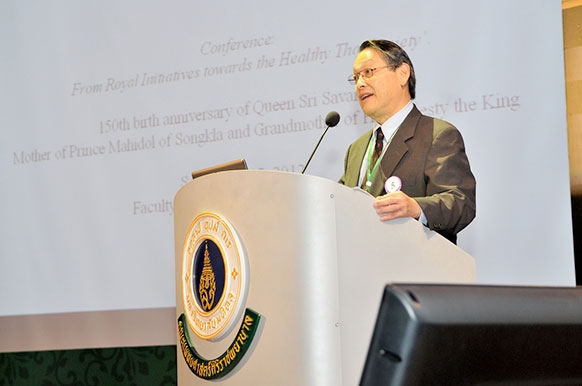Thailand: Pioneering Linkage of Knowledge for Good Health

“Thailand is a country that has successfully demonstrated the linkage of knowledge for health,” CMB President Lincoln Chen said in a speech to commemorate the 150th birth anniversary of Queen Sri Savarindira on September 17 in Bangkok. The country has been able to achieve significant health improvements by building a health system that offers universal coverage and by establishing outstanding medical universities. The challenges in Thailand for the twenty-first century, as for other countries, will be to manage epidemiologic-demographic transitions, incorporate new knowledge and technologies into medical treatment and health maintenance, and ensure that private markets for health do not deplete the human resources of public hospitals and medical universities.
Siriraj Hospital, Thailand’s first modern hospital and the host of Dr. Chen’s speech, was established by King Rama V in 1888. Founding Siriraj was one of several examples that Dr. Chen highlighted to show the royal family’s longstanding commitment to health and the ways that it has helped attract talent and leadership to the health professions. “In Thailand, the medical profession confers high status, social recognition, and societal leadership,” he said. “This medical monopoly of the most talented is distinctive, far beyond the attraction that medicine offers in neighboring Asian societies, where young people also yearn to go into business, management, or engineering.”
Yet medical education is at a critical juncture in Thailand and worldwide, according to Dr. Chen, because of the weakening of patient-centeredness and population equity. He advocated a greater role for transformative learning, a key element of the report issued by the Lancet Commission on Health Professionals for the 21st Century in January 2010. In order to develop professional leadership for health, medical universities should promote “proactive, problem-based learning” and develop “the capacity for synthesizing and analyzing information for sound decision-making.” There also is the essentiality for training in ethics, the humanities and health equity and learning outside the classroom through engagement with local communities, civic organizations, and peers in other countries.
Dr. Chen’s speech, “Transformative Learning for Health Professional Leadership,” was the keynote address for an international conference on medical education. The full text of his remarks was published in the September 2012 issue of the Siriraj Medical Journal.
